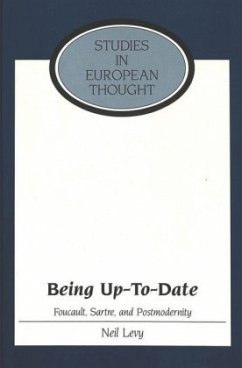It is often claimed that at some time in the recent past, philosophy underwent a profound transformation. The era inaugurated perhaps by Descartes has come to an end, and we have entered the epoch of postmodernity. This book examines that claim by focusing on two exemplary figures, representative of modernity and postmodernity respectively: Jean-Paul Sartre and Michel Foucault. Concentrating on their political thought, it shows that each is beset by the same kinds of problems and evolves parallel and complementary solutions. The continuities that exist between them are sufficient to call into question the notion that a fissure runs between the two epochs they represent; nevertheless Neil Levy suggests that their thought can be seen as presenting us with the resources for thinking and criticizing our present in a manner that is alert to the paradoxes and contingencies often seen as characterizing postmodernity.
Bitte wählen Sie Ihr Anliegen aus.
Rechnungen
Retourenschein anfordern
Bestellstatus
Storno

